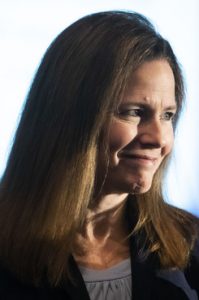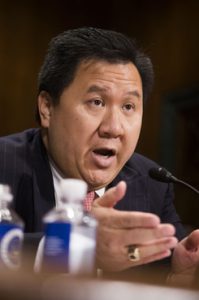Making Waves: Trump's Judges Court Controversy in Early Legal Writings
Through concurrences and dissents, Trump's judicial picks have tackled the Second Amendment, Title VII and other hot-button legal issues.
May 31, 2019 at 11:59 PM
9 minute read

Two years into President Donald Trump's aggressive push to reshape the federal judiciary, the administration's judicial picks are making waves on the bench as they issue opinions on the Second Amendment, abortion and LGBTQ issues.
Settling into what will be lifetime appointments on the federal courts of appeals, Trump's court picks have begun issuing hot dissents and brow-raising concurrences and staking out stronger positions on social issues than other conservative-appointed judges.
The U.S. Supreme Court hears several dozen cases a year, but it's the nation's appellate courts that have the final say on thousands of matters and ultimately shape much of the law. In what has been an area of standout success, Trump's judicial machine has, with the help of a Republican-led Senate, confirmed over three-dozen appellate judges in about two years. That project has given rise to a crop of Trump appointees who have written pronounced opinions in their first months on the bench. Conservatives have taken notice and say these judges—including Amy Coney Barrett on the Seventh Circuit, James Ho on the Fifth Circuit and Amul Thapar on the Sixth Circuit—are emerging as leaders on the appellate courts.
While conservatives see rising stars, alarmed liberals see Trump picks pushing the limits. "It's just become more extreme," said Caroline Fredrickson, president of the liberal American Constitution Society. "They're speaking out in a way that I think is more distinctive than in the past, and delineating positions as lower court judges in a stronger way than has been done."
That rising class of outspoken jurists appears to be a result of the administration's effort to select nominees who have demonstrated, as former White House counsel Donald McGahn once described it, "courage" in their careers: those who've taken strong, if not unpopular, stances.
Ilya Shapiro, the director of the libertarian Cato Institute's Constitutional Studies Center, describes it as a development on how past administrations have selected nominees, "picking textualists and originalists, not simply picking people who have a loyalty to the Republican party or are more on the right than on the left." And that, he said, translates to strong opinions, "not just a bland technocratic analysis."
The trend has fueled questions of whether Trump's appointees are writing intentionally flashy opinions to audition for future openings on the Supreme Court. The appellate courts often serve as farm teams for the high court, and it's a practice that many liberal and conservative appellate judges—not just Trump appointees—do to stand out from their peers.
Still, Leonard Leo, an executive vice president of the Federalist Society, disagrees. Speaking in his personal capacity as an outside adviser to the White House on judicial nominations, he brushed off the idea that the judges are trying to stand out for future high court openings.
"They're devoted to their craft," Leo said. "I don't think the fact that they might be questioning a certain line of doctrine or providing a road map for the future is their way of auditioning for the Supreme Court. I think it's their way of recognizing there are existing problems with the rule of law and the structural constitution and feel it's their duty to hasten the correction of existing doctrine."
Praveen Fernandes, a vice president at the liberal Constitutional Accountability Center, views some of these Trump nominees as going too far. Some of these provocative opinions "give lie to claims made at confirmation hearings where these nominees have cloaked themselves in judicial modesty, purportedly being hemmed in by the role of a judge to decide only the issues before them and to be guided exclusively by text and precedent," Fernandes said.
The Decisions
Trump appointees, who occupy a fifth of the federal circuit court seats, have only had enough time on the bench to offer a glimpse into their jurisprudence. But they are asserting themselves in their writings in ways that show they're unafraid to take on controversial issues.
 Amy Coney Barrett, U.S. Court of Appeals for the Seventh Circuit, speaking during a panel discussion titled "The Future of the Past: Stare Decisis," at The Federalist Society's 2018 National Lawyers Convention, held at The Mayflower Hotel in Washington, D.C., on Thursday, November 15, 2018.
Amy Coney Barrett, U.S. Court of Appeals for the Seventh Circuit, speaking during a panel discussion titled "The Future of the Past: Stare Decisis," at The Federalist Society's 2018 National Lawyers Convention, held at The Mayflower Hotel in Washington, D.C., on Thursday, November 15, 2018.Ho caught heat during his first days on the U.S. Court of Appeals for the Fifth Circuit after a pair of bold writings on abortion and campaign contribution limits. Lately, he has raised eyebrows for a pair of rulings related to LGBTQ issues.
In February, a Fifth Circuit panel affirmed the dismissal of a job discrimination lawsuit brought by a transgender woman who was born male. The panel, in an opinion Ho wrote, agreed to toss the case, Wittmer v. Phillips 66 Co., on factual grounds.
But Ho wrote separately, in a concurrence that doubled the length of his own majority opinion, to argue that Title VII of the Civil Rights Act of 1964 does not protect against sexual orientation or transgender discrimination. He explained that the original public meaning of "sex" at the time didn't include sexual orientation or transgender status.
The judge pointed to a view on the Supreme Court that Congress doesn't "hide elephants in mouseholes." If lawmakers had intended to prohibit sexual orientation or transgender discrimination under the federal civil rights law, Ho explained, "surely the most straightforward way to do so would have been to add 'sexual orientation' or 'transgender status' or 'gender identity' to the list of classifications protected under Title VII."
Ho was also part of a split panel in March that held a Texas policy barring sex reassignment surgery for transgender inmates does not violate the Eighth Amendment. The judge wrote for the majority, relying on the record in a similar First Circuit en banc opinion to stress that there was a fierce debate about the medical necessity of sex reassignment surgery. "Where, as here, there is robust and substantial good faith disagreement dividing respected members of the expert medical community, there can be no claim under the Eighth Amendment," Ho wrote.
The opinion drew a rebuke from Judge Rhesa Barksdale, a George H.W. Bush appointee, who used his dissent to lambast the majority for going "far outside the totally lacking summary-judgment record at hand in holding judgment was properly granted."
Trump's appointees, including Ho, are also among the most outspoken jurists in decrying what they see as a trend of courts disfavoring the Second Amendment.
In the U.S. Court of Appeals for the Seventh Circuit, Judge Amy Coney Barrett—a Supreme Court shortlister—recently issued a 37-page dissent in a felon dispossession case. The panel held 2-1 in Kanter v. Barr that Wisconsin and federal felon dispossession statutes were constitutional as applied to a nonviolent felon who was convicted of mail fraud.
Barrett split with the two Reagan appointees who held the governments' application of firearm bans to the plaintiff was "substantially related" to their interest in preventing gun violence.
 James Ho testifies before the Senate Judiciary Committee during his confirmation hearing to be a judge on the U.S. Circuit Court for the Fifth Circuit, on Wednesday, November 15, 2017.
James Ho testifies before the Senate Judiciary Committee during his confirmation hearing to be a judge on the U.S. Circuit Court for the Fifth Circuit, on Wednesday, November 15, 2017."Absent evidence that he either belongs to a dangerous category or bears individual markers of risk," Barrett said, "permanently disqualifying Kanter from possessing a gun violates the Second Amendment." Barrett said the court's holding treated the amendment as a "second-class right, subject to an entirely different body of rules than the other Bill of Rights."
Barrett's take came months after Judge Stephanos Bibas, a Trump appointee to the Third Circuit, dissented from a panel decision that upheld a New Jersey ban on certain large-capacity gun magazines passed in the wake of several mass-shootings.
Bibas' dissent argued the court should have applied strict, not intermediate scrutiny to assess the law, because it impaired a "core right" of the Second Amendment. Either way, he said, the state failed to sufficiently show how the law advanced its interest in reducing gun deaths.
And last year, two other Trump appointees on the Fifth Circuit—Ho and Judge Don Willett—protested the court's denial of a full panel rehearing of a decision that upheld the federal ban on interstate handgun sales. In a dissent, Ho complained the Second Amendment "continues to be treated as a 'second-class' right." The Fifth Circuit panel, he said, erred because the government's ban on interstate sales failed under strict scrutiny.
Willett, another Supreme Court shortlister for Trump, penned a searing dissent that bemoaned of the Second Amendment's treatment as a spurned, snubbed and scorned amendment. It's "neither second class, nor second rate, nor second tier," he wrote.
The president's picks are shaking up the judiciary in other ways. Eleventh Circuit Judge Kevin Newsom, another of Trump's Supreme Court shortlisters, sparked intrigue early on for a pair of opinions: one where he wrote for a unanimous panel that upheld the IRS' denial of a tax deduction to a gay man who paid for the costs of in vitro fertilization to father children; and another in Kondrat'yev v. City of Pensacola, a case that deals with a religious symbol in a public space, where Newsom questioned circuit precedent in a concurrence.
And last year, Willett questioned the Supreme Court's qualified immunity doctrine in a "concurring dubitante" that decried the "kudzu-like creep of the modern immunity regime." Thapar, another shortlister, last year penned a concurrence questioning Auer deference, which broadly requires courts to defer to an agency's interpretation of its own ambiguous regulations.
The Supreme Court is weighing that issue of agency deference this term and has teed up a trio of cases to consider Title VII's scope next year, so the high court will have final say on those matters. But for these judges, their writings are just peeks into what will likely be decadeslong careers on the federal bench.
This content has been archived. It is available through our partners, LexisNexis® and Bloomberg Law.
To view this content, please continue to their sites.
Not a Lexis Subscriber?
Subscribe Now
Not a Bloomberg Law Subscriber?
Subscribe Now
NOT FOR REPRINT
© 2025 ALM Global, LLC, All Rights Reserved. Request academic re-use from www.copyright.com. All other uses, submit a request to [email protected]. For more information visit Asset & Logo Licensing.
You Might Like
View All
US Judge Cannon Blocks DOJ From Releasing Final Report in Trump Documents Probe
3 minute read
Private Equity Giant KKR Refiles SDNY Countersuit in DOJ Premerger Filing Row
3 minute read
Several Big Law Firms Saw Year-Over-Year Lobbying Revenue Growth in 2024
4 minute readTrending Stories
- 1The Intersection of Labor Law and Politics Following the Presidential Election
- 2Critical Mass With Law.com’s Amanda Bronstad: LA Judge Orders Edison to Preserve Wildfire Evidence, Is Kline & Specter Fight With Thomas Bosworth Finally Over?
- 3What Businesses Need to Know About Anticipated FTC Leadership Changes
- 4Federal Court Considers Blurry Lines Between Artist's Consultant and Business Manager
- 5US Judge Cannon Blocks DOJ From Releasing Final Report in Trump Documents Probe
Who Got The Work
J. Brugh Lower of Gibbons has entered an appearance for industrial equipment supplier Devco Corporation in a pending trademark infringement lawsuit. The suit, accusing the defendant of selling knock-off Graco products, was filed Dec. 18 in New Jersey District Court by Rivkin Radler on behalf of Graco Inc. and Graco Minnesota. The case, assigned to U.S. District Judge Zahid N. Quraishi, is 3:24-cv-11294, Graco Inc. et al v. Devco Corporation.
Who Got The Work
Rebecca Maller-Stein and Kent A. Yalowitz of Arnold & Porter Kaye Scholer have entered their appearances for Hanaco Venture Capital and its executives, Lior Prosor and David Frankel, in a pending securities lawsuit. The action, filed on Dec. 24 in New York Southern District Court by Zell, Aron & Co. on behalf of Goldeneye Advisors, accuses the defendants of negligently and fraudulently managing the plaintiff's $1 million investment. The case, assigned to U.S. District Judge Vernon S. Broderick, is 1:24-cv-09918, Goldeneye Advisors, LLC v. Hanaco Venture Capital, Ltd. et al.
Who Got The Work
Attorneys from A&O Shearman has stepped in as defense counsel for Toronto-Dominion Bank and other defendants in a pending securities class action. The suit, filed Dec. 11 in New York Southern District Court by Bleichmar Fonti & Auld, accuses the defendants of concealing the bank's 'pervasive' deficiencies in regards to its compliance with the Bank Secrecy Act and the quality of its anti-money laundering controls. The case, assigned to U.S. District Judge Arun Subramanian, is 1:24-cv-09445, Gonzalez v. The Toronto-Dominion Bank et al.
Who Got The Work
Crown Castle International, a Pennsylvania company providing shared communications infrastructure, has turned to Luke D. Wolf of Gordon Rees Scully Mansukhani to fend off a pending breach-of-contract lawsuit. The court action, filed Nov. 25 in Michigan Eastern District Court by Hooper Hathaway PC on behalf of The Town Residences LLC, accuses Crown Castle of failing to transfer approximately $30,000 in utility payments from T-Mobile in breach of a roof-top lease and assignment agreement. The case, assigned to U.S. District Judge Susan K. Declercq, is 2:24-cv-13131, The Town Residences LLC v. T-Mobile US, Inc. et al.
Who Got The Work
Wilfred P. Coronato and Daniel M. Schwartz of McCarter & English have stepped in as defense counsel to Electrolux Home Products Inc. in a pending product liability lawsuit. The court action, filed Nov. 26 in New York Eastern District Court by Poulos Lopiccolo PC and Nagel Rice LLP on behalf of David Stern, alleges that the defendant's refrigerators’ drawers and shelving repeatedly break and fall apart within months after purchase. The case, assigned to U.S. District Judge Joan M. Azrack, is 2:24-cv-08204, Stern v. Electrolux Home Products, Inc.
Featured Firms
Law Offices of Gary Martin Hays & Associates, P.C.
(470) 294-1674
Law Offices of Mark E. Salomone
(857) 444-6468
Smith & Hassler
(713) 739-1250











